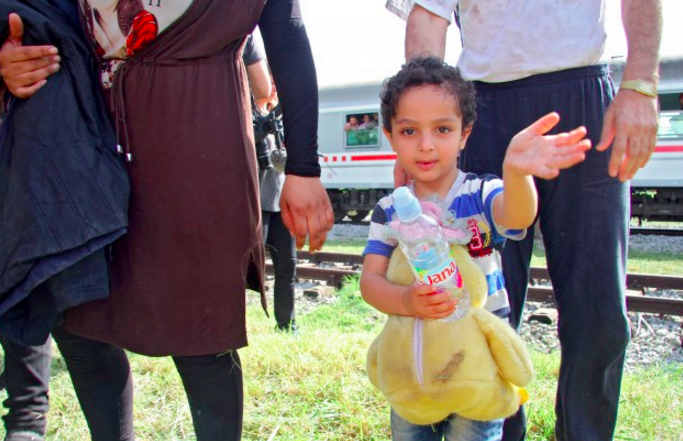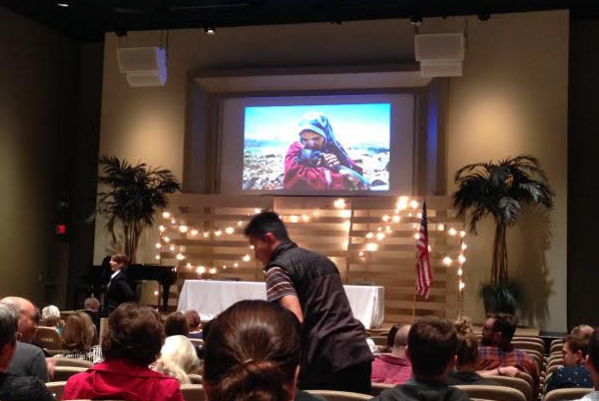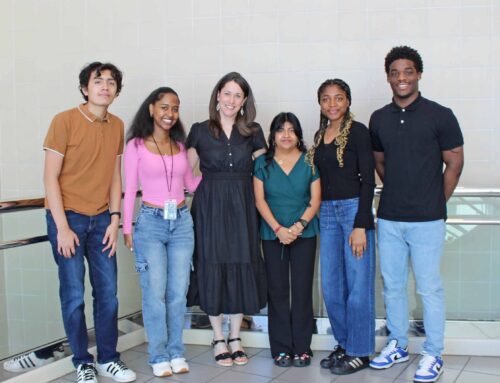Organizers of a Tuesday meeting to discuss the Syrian refugee crisis did not know they would be exploring a controversial topic. That is, until last Friday, when terrorists attacked Paris, which prompted Texas’ governor Greg Abbott to announce intentions to block refugee resettlement in our state.
Now, “It’s an issue just about everyone is talking about,” says Rebecca Walls, executive director of Unite, which hosted the event.
Some 75 people (plus a few uniformed police officers) gathered at Fellowship Church on North Central Expressway near Park Lane for an informational meeting about Syrian refugees in the Dallas area. Unite is a Northeast Dallas-based group aimed at helping churches collaborate and organize to most-efficiently aid struggling Dallas residents and neighborhoods.
Keynote presenter Jason Clarke — founder of Seek The Peace, a Vickery Meadow-based refugee assistance nonprofit — launched right into discussing current events, addressing misinformation that he says is harming refugee families in Vickery Meadow (a community that flanks Lake Highlands, East Dallas and Preston Hollow) and beyond.
Specifically, he disputed the idea that participation in the official refugee program would put Americans at undue risk of terrorism, and he tackled assertions that the United States cannot adequately vet refugees.
“These statements have been taken out of context and … fly in the face of everything we know about the official U.S. resettlement program, which has been successful since the 1970s,” says Clarke.
The Syrian civil war, which has been going on five years, has forced 9.5 million people from their homes, he told the audience, and went on to briefly explain the origins and world-wide impact of the Syrian civil war.
Key to his message was explaining the difference between asylees and refugees.
The people we see flooding into Europe, asylees, and refugees seeking legal immigration are two completely different things; their situations are addressed through two completely different models.
“The people rushing toward Europe, in search of safety and security, is a form of technically illegal immigration that is fundamentally different from the U.S. resettlement program,” Clarke explains.
Refugees go through a very strict 18-24 month security check before being accepted to the U.S. resettlement program, he continues.
“Since 1975 the U.S. has resettled three million refugees. The United Nations vets refugees and send their cases through multiple U.S. agencies to find out who they are. The idea that we don’t know who’s coming in is not accurate. These people have undergone a more rigorous background check than you or I, unless you are a refugee. This is a very successful and extensively backed up program.”
The program is not perfect, but it is strict, he says, and of about 50 million refugees around the world, less than one percent are resettled through the U.N resettlement program.
“It is a big deal to be approved for resettlement,” Clarke says.
Unite called on local churches to support resettlement programs and refugees, and Walls highlighted specific sustainability and mentoring strategies that they aim to take to area congregations.
“We believe that over the next few months, we’ll be able to get this information in front of at least half of the Metroplex churches. As we’re working with the resettlement agencies and public sector leaders, this is going to create a citywide plan that we believe will build capacity of our system of care to help all of the incoming Syrians get on their feet,” notes an invite to Tuesday’s meeting. “We’re thrilled because we believe that this will leave the system with even more capacity to serve refugees, immigrants, and others on an ongoing basis.”
One critic in attendance voiced his persisting concerns about the U.S.’s acceptance of Syrian refugees and argued that we should be directing attention to those in need at home.
Walls responded that helping local people in need is the exact purpose of Unite, and something they are doing every day.
“Helping people at home and helping refugees is not a zero sum game,” Clarke adds. “We can care for veterans, local [people] as well as others.”
In attendance were many local resettlement professionals, including Samira Izadi, who I wrote about last year.
Dallas Mayor Mike Rawlings told the Morning News today that he would participate in organized, vetted resettlement programs.







